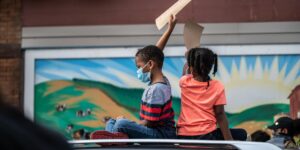I think about that book Souls of Black Folk by W.E.B. Du Bois, when he talked about double consciousness. I feel like I have more than a double consciousness. I am an educator, a parent, a Black woman. I have so many different lenses that I view the world through that sometimes I feel conflicted inside. Different perspectives that I’m able to see from.
— Charmaine Bell
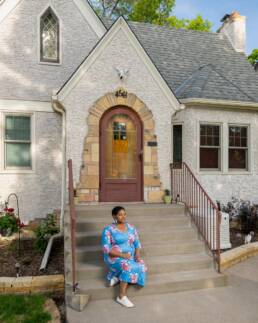
Roots
I’ve been on a journey to discover my heritage. I decided to go deeper through 23 and Me. I tried going through the census to get as far back as I could, but it stopped at slavery. I took a DNA test and learned that I am closely matched with people of Nigeria, Portugal, and Scotland. I began researching Nigerian history and the history of the Portuguese. I’m still on that journey. My family is leaning on me to figure it out because they don’t have the answers.
Seeing things through a racial lens? I was born into that. My grandmother is from British Columbia, in Canada, and my grandfather is from Mississippi. They married during the time when mixed marriages were against the law in many states, so that has shaped a lot of how I see the world and how my mom and I were raised. My grandfather served in the military, in the United States Navy. On the USS Midway he was stationed at Whidbey Island in Washington state, near the Canadian border, and met my grandmother.
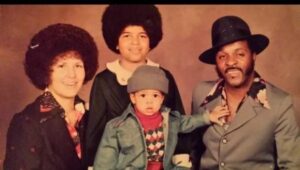
In 1965, after he served in Vietnam, they moved to Virginia where mixed marriages were still against the law. My grandma said, this is not the place for me. They settled in a house that was a few blocks from where she lives now, in South Minneapolis. When Grandpa got back from service, he became a Navy recruiter, and they bought the house she’s in right now. A few blocks away is the house where the first Black family moved into the area. My grandma remembers having conversations with her good friend Mary Foreman who lived in that house about the big crowd of white people that stood in front of their family’s home when she was a child. Recently, with the uptick in crime, I asked her if she would consider selling her house. I was concerned about her and my mom living in that big house in that area of the city. She said, “No one will run me out of my house.”
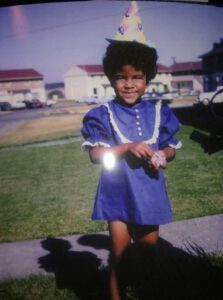
Childhood
I grew up with the best of both worlds. I was exposed to luxurious things and to the street. My grandfather and grandmother worked really hard. My grandma had a good job working for the Bureau of Engraving, making computer chips for the earliest computers. She had an old machine in her basement. My sister and I played Oregon Trail on it.
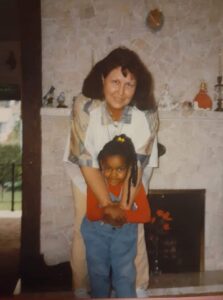
Grandmother and Charmaine, Winnipeg, Canada, 1993.
My mom was born in Seattle, WA and my dad is from Alabama. It’s kind of a similar story as my grandparents. My dad had just gotten out of the Navy when he met my mom. He decided not to move back to Alabama and became a chef at Tony Roma’s in Minneapolis. My mom worked multiple jobs to make ends meet. My dad, while he loved us, wasn’t always around to help. I watched my mom hustle. She was resourceful. She knew how to make a meal out of nothing. She wanted to ensure we had as normal of a childhood as she could provide. She also had a lot of pride. My grandpa and grandma would have helped more, but I think my mom just didn’t want to lean on them too much. She wanted to be independent. She raised me and my sister the best way she could. She is very giving; always helping other people. Our house was the house where girls at my school that we’re having a hard time could come and live. There were family and friends who lived with us as well when they fell on hard times. My mom’s still that way. I tell her, I’m giving too, but I also like having boundaries. I can say no. She has a hard time with that because she just has a really big heart.
I have been around people that did drugs. I was around people that were hustling. My mom tried her best to keep my sister and me out of trouble, but we were out there when my mom was at work, running in the street at night and hurrying home before she got back. At grandma’s house there were other kids in the neighborhood who weren’t into any trouble like me or my sister, that we could hang out with. That helped us to enjoy just being kids. Because I’m the oldest, I was very aware of my mom’s struggles, even though she didn’t tell me that she was struggling with bills, I knew it. I remember once when we went to Footlocker. She looked at me and my sister Ashley and said, “OK you guys can get 2 pairs of shoes each.” Mom saw me looking at the prices, like I always did. She said, “It’s OK baby, go ahead.” Today I buy from the thrift store or search for a good deal. My mom still wants me to have nice things. She still buys clothes for me.
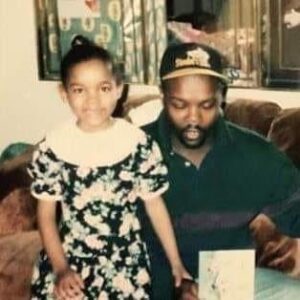
Charmaine and her dad. Christmas at Grandma’s house, South Minneapolis, 1994.
An Educator Who Addresses the Whole Child/Family
I’ve always been drawn to education. I’m one of the oldest cousins, so I’ve always taken care of children. I started off in the nonprofit world. I worked for Catholic Charities and Baby Space as an early childhood teacher. I also worked in the early childhood program of the Wilder Foundation. After that I worked for MN Reading Corps as a literacy tutor and vocabulary specialist. Being a tutor led to my position with Minneapolis Public Schools.
I worked for MPS for about four years, starting off as an assistant teacher. I think most Black para-professionals at MPS find themselves in a position where they’re the ones dealing with behavior problems. I was getting to know the families and they were sharing their struggles with me, what they were having a hard time with. Because I’ve utilized many of the resources and the welfare system myself as the single mom of three kids, I was able to help them.
Another staff who works in the ECFE (Early Childhood Family Education) program overheard me talking to a family, and asked me to join their child’s IEP meeting with them because they felt uncomfortable. I said sure. After the meeting she said, “Maybe you shouldn’t be an assistant teacher; you should be working with families because that’s what you’re naturally doing.” I applied immediately and the next school year I became an official Family Liaison at Whittier in Uptown.
I loved working with families, helping them navigate the county system, helping them apply for jobs. They’d come back and hug me because they got the job. I showed them how to advocate for their scholars, giving them the verbiage to use. I’d tell them, “You already knew what you wanted to say, but unfortunately in the school system, if you’re not talking in their lingo, they’re not really listening to you.” I would basically write out scripts for parents to use in an IEP meeting or during conferences; questions to ask. I still am connected with a lot of my Minneapolis families even though I don’t work in Minneapolis anymore.
I ended up leaving Whittier after a tragedy. The dad in a family I worked very closely with took his own life. It was too hard for me to stay in that environment. So I left and I went to Hopkins Public School District. They didn’t really know what they wanted from me, as my position was new to the district, and so it turned into me addressing student behaviors again in the building. I wasn’t very happy with that. It got to a point where I was crying in my office every day from the lack of respect and inability to use my skills with families. When I did try to push back against negative policies, I felt that I was silenced a lot of times. Censored. I’m still active in the school district because my children attend school in the Hopkins district, so they haven’t gotten rid of me completely. I’m still at and tuning into board meetings. I’m still emailing them about different policies I feel they need to change.
Now I work for ICA food shelf in Minnetonka as a Community Outreach Liaison. I’m still in the schools because we’re putting food markets in schools to make it more accessible to families and take away some of the stigma that comes with asking for help. I’m still in the community and I still get to see a lot of the families I worked with. I still get to see my students. I’m excited about that! I’m also contracted with Northside Achievement Zone. I facilitate their Family Academy classes, working with moms and grandmas and uncles and dads; going over how to build a college mindset with their scholars; how the brains of their scholars’ works, helping children learn how to regulate themselves and get to a point where they can be themselves freely and confidently.
The Perspective of a Single Parent and a Black Woman
I’m a single parent. It’s not easy. I’ll be honest. I’m very tired. I have a lot going on, but I still want to give back and help people. We’re all kind of in the same boat. We can hold each other up. I’m trying to break some cycles. My mother and I have these conversations. She says, “Well, I’m not educated like you, so I’m a bad mom.” I had to tell her, “When you say you’re a bad mom, you’re saying there’s something wrong with me. You made sure I graduated from high school, made it to a two-year degree. I’m on my way to a four-year degree. I hope my kids go even further, not just in education, but in homeownership, financial stability, spiritual health.” I keep on reassuring her that I’m where I am because of her struggles and efforts. I had the best of both worlds. I experienced the poor side of it and then the more luxurious side. It was a balancing act.
As a Black woman. I have to code switch a lot. I’ve learned to adapt to people of different socioeconomic backgrounds because of my experience as a child. I get along with everybody, for the most part. When I see them do certain things, I don’t judge right away. I just assume there’s something deeper going on because I’ve seen both sides.
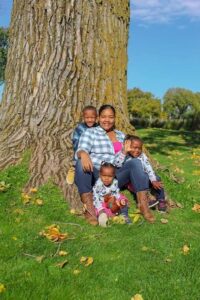
Unions and White Supremacy
I loved my union when I was a PARA in Minneapolis, but I think unions have to do the work of looking at how they’re upholding white supremacy. We have senior teachers who are being protected that are breaking kids’ spirits. When I go to the superintendents, or the principals, they say “There’s nothing we can do. Our hands are tied.” When I worked at Hopkins I heard a teacher tell a young girl who was walking in the hallway, talking back to the teacher, say,” I’m going to call your mom and you’re going to have to stay home.” The girl said, “That’s fine!” The teacher then replied “Your mom won’t bring you to school and you’ll probably get deported.” I stepped outside of my office and addressed the teacher. The teacher said to me “You need to mind your own business” I said, “You made it my business when you just disrespected this child.” I grabbed the little girl and put her in my office, and then me and that teacher got into an argument in the hallway. That happened a lot. It wasn’t one time it wasn’t two times. I felt like I was having to do that at least four or five times a week: correcting teachers for the way they talked to kids. One teacher grabbed a little girl by her hijab and it made me so angry.
I think back to my childhood experiences when teachers were disrespectful to me like that. Now they’re shifting to treating immigrant children that way, because the black kids started being vocal. They started telling their parents. (As a parent there’s no way you would get away with treating my children that way.) So now they’re messing with children who they know are going to have a hard time explaining to their parents what’s happening. There are language barriers, cultural barriers that keep those parents from being able to advocate or protect their children effectively in the school system. I ultimately want the schools and our community to do better so that both students and teachers can be successful.
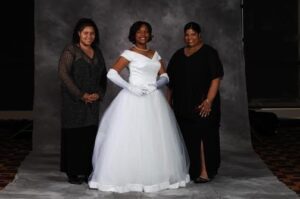
Training For Parent Advocates in Schools
I’m a parent and I’m an educator. As a parent, I am the true definition of a Mama Bear. I do not play with them. I email the teachers probably once every two weeks. If my son struggled in class this week, I could focus at home with him. A teacher told me he’s fine and doing well academically. I told her, “You’re telling me he’s fine but he’s not. How’s his reading going? Does he comprehend? Because when I asked him questions when I read to him at home, I can see he’s struggling with comprehension. Just because the other kids are struggling, they think I should be OK with my child struggling. Instead, I want to help other parents advocate for their kids. Parents who are working in schools with our students often have the best relationships with them, but there’s no training for them, there is no chance for growth. There are pathway programs, but you have to already have a bachelor’s degree. Many of those with the strongest relationships with the children don’t have that. So I would love to see better pathway programs for parents and support staff so they can work with their and other children in the schools in a way that is meaningful.
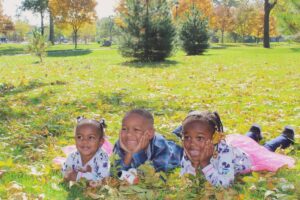
Diversity Training Must Include Enforcement
I remember this mom in my Northside class saying, “I hate when people say knowledge is power. Applied knowledge is power.” That has stuck with me.
I made a statement to the assistant superintendent in Hopkins. I said, “Get rid of diversity trainings! What’s the point if there’s no enforcement? What they are learning in these diversity classes is not being applied. There’s nothing added into their evaluation.” I think people are confused. They don’t know if they’re applying what they’ve learned in these diversity trainings. We need to change the mindset toward action.
In some school districts they gave money to the principals and said, ‘spend it the way you see fit.’ They didn’t have anyone mentoring them on identifying needs so they could spend that money properly. In the school I worked at in Hopkins, they hired a restorative practices person and two counselors when we only had one social worker who was already working full time with special needs kids. Why would they hire two counselors and not another social worker for the general education population? I said “We have one person that does mental health services but she has a waiting list. Why wouldn’t we put money into getting another mental health specialist in the building? The counselors are just running around temporarily putting fires out. They want to do more, but they are women of color being used to deal with behaviors as usual. That doesn’t make sense to me.” I was even given some social worker duties. I said “I’m not going to do this unless you either give me some training, or pay for me to go back to school to be a social worker.” They got mad at me for speaking up. The energy in the building was not good.
Family-Friendly Changes Needed to the Truancy System
As the family liaison, I saw problems in the truancy system. I talked to the leaders of the Hennepin County Be@School program via email about this and told them the policies are not family friendly. At three days absence you get a letter. After six absences they get filed. There is a second filing at 9 days. I said, “As a family liaison, if I reach out to them at three days, I need to be able to address their barriers. I can’t do that within nine days. When I’m working with them and suddenly, they get filed on again, they are looking at me like, “What’s the point of working with you. You’re just going to keep filing on us.” So, I was excited when they switched it up and gave us a little bit more time, but it’s still not enough.
I had one mom I worked with for two months. She faced many barriers from Child Protection Services being involved, late school arrival every day, or they weren’t coming at all, mental health concerns, parenting alone, no transportation, homelessness, lack of childcare, and more. I talked to this mom. She didn’t feel welcomed in our school building. I said let’s start with childcare assistance. Then I got her resources for mental health services. We figured out housing for her. We figured out transportation. We got the kids school buses. The kids were at school, on time, this whole last school year: No CPS involvement. We broke it down into manageable steps, so that she didn’t feel so overwhelmed. It took two months to work all of that out. I gave her my personal phone number for over the summer. I said you call me whenever you need anything this summer. If you don’t have enough money for food we’re going to find you a food shelf. I had built a pretty good relationship with this mom. She felt comfortable to reach out to me with any problem. One day she said, “My kid won’t go to sleep.” I said, “Well do you mind if I come over and check out his sleep environment?” I walked into her house, and it was blazing hot. I showed her research about how a cool environment and turning off those blue lights, covering up those windows would help her and her babies get good rest. We did all those things and her kids started going to sleep.
I learned those things when I went through a program through Northpoint Wellness Center, and I took a class called Circle of Security. It was a parenting class. There were four or five black women that worked at North Point and did parenting classes and they helped me so much. Everything from sleeping to breast feeding, to how to use a car seat. It’s the each one teach one model I like to follow. Hopefully that mom will do the same for another mom that needs that help.
I know mothers whose children died, and they’re still showing up for schools and other children. They are still seeking education around their child’s development, even though that might have been their only child. I cry thinking about their strength.
W.E.B. Du Bois, and My Multiple Consciousnesses
I think about that book Souls of Black Folk by W.E.B. Du Bois, when he talked about double consciousness. I feel like I have more than a double consciousness. I have many different lenses that I view the world through. And depending on which lens I’m looking through, that helps form my opinions. I can see multiple sides. Sometimes that’s a blessing that I can do that. Other times it’s a curse. You just don’t know how to feel, how to react.
I have my educator lens. I might have used that during the teacher’s strike. I understand it. When I look at it as a parent, I’m like but what about the babies? When I look at it as a Black person I think, this is further setting the children back. I have so many different lenses that I view the world through that sometimes I feel conflicted inside. Different perspectives that I’m able to see from. So, while I support my colleagues, at the same time I’m thinking there’s babies out here dying. As a Black mother and as a person who has lost a few students I worked with I have that other consciousness. The kids that have died over North Minneapolis have been the siblings of kids that I’ve worked with. It’s just a constant worry. I worry about my son. I worry about my daughters.
There are days where filling my current position with ICA, where I’m one of two Black people working there. I get a lot of questions—mainly from volunteers. It’s not like people trying to be funny or anything but true curiosity. Questions about African American culture, questions about reparations. I can tell the difference between someone who’s just trying to nag and pick at me and someone who wants to learn. I want them to understand that what I say to them is my own perspective it’s not all Black people. We all don’t think the same. I try to be open minded enough to have those conversations, but at the same time I have my days when I think: “I shouldn’t have to teach you. I shouldn’t have to answer your question.” I also don’t want to come off as standoffish. It’s hard being one of two Black people in an all-white space. I love my colleagues, but I also feel a bit out of place or alone sometimes. I appreciate ICA’s efforts to becoming more inclusive in an area where the demographics are changing quickly.
I keep thinking about W.E.B. Du Bois and double consciousness and what that means to me, what it means for my kids. It’s constant. I remember someone asking me when do you just breathe? I don’t. I haven’t been breathing since I was born. I can see that in my kids. They’re constantly having to the navigate the system and race. One day I hope to breathe. As a single parent trying to co-parent through court systems, working in a field where you’re helping people and I am going through the same thing as clients, it’s hard because we have certain images that we’re trying to uphold, but we’re going through it. We’re going through a really hard time, but many of us feel like as Black women and Black men, we must be perfect. If we have one slip up; one bad thing gets out about us, then it messes up everything. We’re not allowed that same grace and our white counterparts have, to mess up. Like when you’re angry at someone but you can’t fully be angry. I was reading your book Allegiance to the Wind and Waters, and I was thinking about the part where you were talking about how you and your husband were upset with each other. You were angry. I’m not allowed to explore that. I’m not allowed to explore the emotion of anger as a Black woman. I just I hold it all in and then it shows up in my health. I get sick because I’m not allowed to let it out.
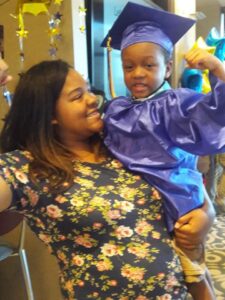
The Vision of a Future Policy Maker
On top of everything else, I’m also in college myself, going to Concordia. I pay out of pocket, so I’m only taking one or two classes a semester. I’m going for my bachelors in Family Science. I already have a two-year degree in education. I see myself going back into the school system, but I want to help create policies on a state level or help families through the court systems. The policies I would create would be based on my experience and knowledge as a parent and advocate for families. I would make sure my policies included enforcement. I think a lot of people in those positions are far removed from what’s actually happening in the schools, and who they’re creating the policies for. They’re not getting the full picture of what it looks like; the day-to-day experience of our students in these buildings. I would like to be in a position where I can help with that.
